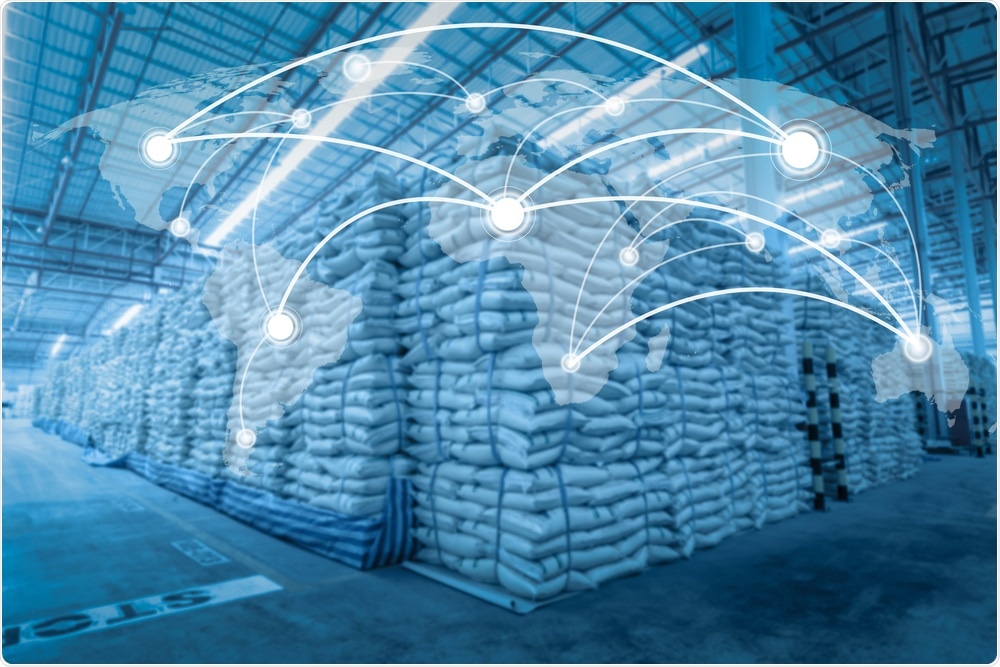New research suggests that international trade flows are the one major positive factor impacting global food supply, with other global drivers harming sustainability.
The looming food crisis
Recent years have seen food prices sore, with wheat and corn tripling and rice becoming five times more expensive between 2005 and 2008. These instances induced food riots in over 20 countries around the world and saw more than 75 million more people pushed into poverty.

Image Credit: KAMONRAT/Shutterstock.com
Although currently, the world is producing enough food to feed all its inhabitants, a significant portion of the population goes hungry. The UN estimate that 815 million people, representing 11% of the population, didn’t get access to enough food in 2016.
By 2050 it is expected that this figure will rise to 9.8 billion and that the world’s food supplies will be strained. In just 30 years, the demand for food will have risen by 60%, however, our ability to meet this need will have reduced due to the impacts of climate change, soil degradation, and urbanization.
Also, factors such as pollution and water shortages are predicted to exacerbate the problem.
This week, a study published in the journal PLOS ONE describes how the increase in international trade flows appears to be the single major global driver to have a net positive impact on global food supply.
Other factors that impact these food systems have been calculated to have an overall negative effect, such as urbanization, population growth and changes in lifestyle.
The fragility of our food systems
The current study concluded that trade has a positive impact on food systems, but that this impact only remains positive up until a point. Beyond this point, the positive impact of this factor plateaus. The benefit of trade does not continue to bring benefit to countries that are deemed “high-income”.
Since global measures have been initiated to address the global pandemic of COVID-19, the fragility of our food systems has been revealed. The global disturbances that the pandemic has brought on have helped to highlight what drives our food systems.
It has also allowed researchers to measure the impact of these factors to provide global polymers with accurate information for enhancing food systems and making them more sustainable and unbreakable in the face of extreme events, such as a pandemic.
Improving food sustainability
Previously, scientists created a map depicting food system sustainability globally which was published in the journal Nature last November. The current study builds on this work that revealed that food systems are usually highly sustainable in high-income countries, and less sustainable in low-income countries.
Inspired by these findings, scientists involved in the current study set out to uncover the drivers of food sustainability at different levels to establish ways to improve sustainability at different points.
Simply put, our food systems reflect how the world is evolving. Global food systems are driven by current factors impacting on global demographic transition. However, the issue is that mostly, these drivers negatively impact our food systems and gaining control of them can be difficult.
For example, factors such as urbanization and the adoption of new ‘modern' lifestyles are known to negatively impact food systems. However, preventing people from migrating and improving their quality of life is difficult, nor is it desirable. Therefore, scientists need to discover ways to mitigate the impact of these factors.
The study’s results indicate that the world will face some significant challenges in the coming years regarding its food supply. However, the team provides initial directions for polymers, directing them of where their efforts are best placed to enhance global food sustainability in the long term.
Sources:
The Global Food Crisis. Available at: https://www.nationalgeographic.com/magazine/2009/06/cheap-food/
The World Is Headed for a Food Security Crisis. Here's How We Can Avert It. Available at: https://time.com/5216532/global-food-security-richard-deverell/
Unsustainable food systems: Can we reverse current trends? Available at: https://www.eurekalert.org/emb_releases/2020-04/icft-ufs040220.php